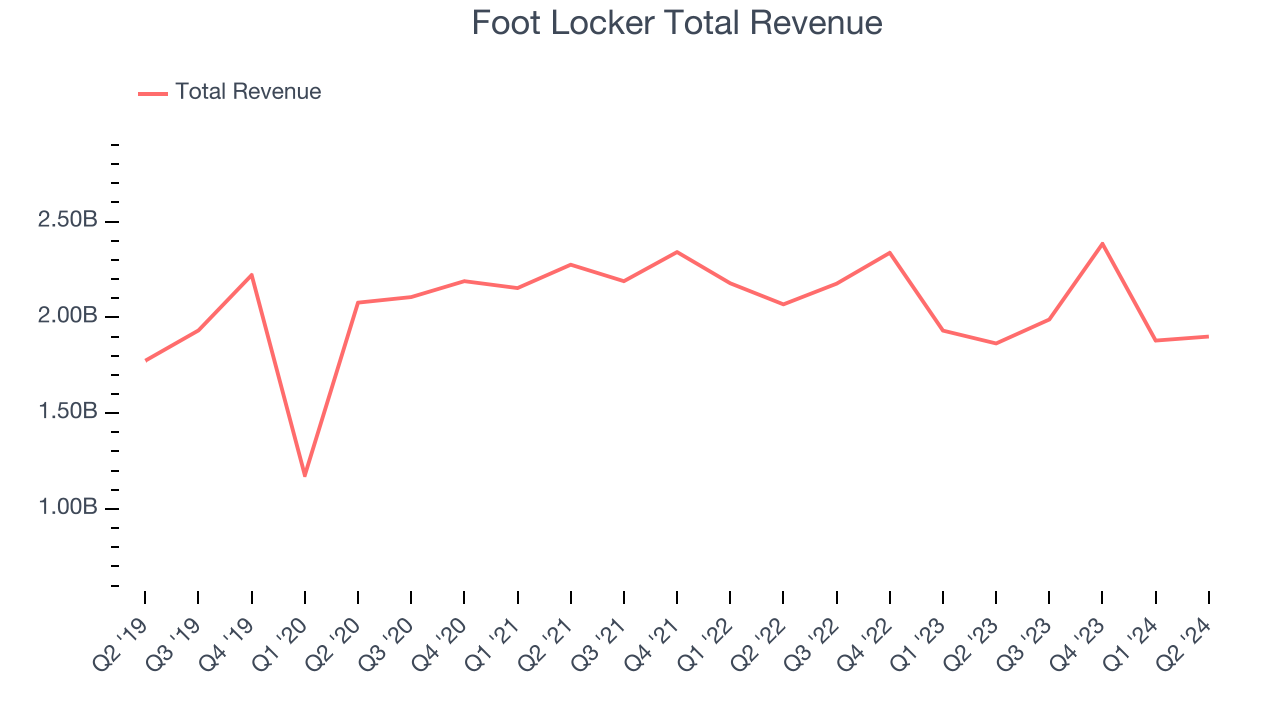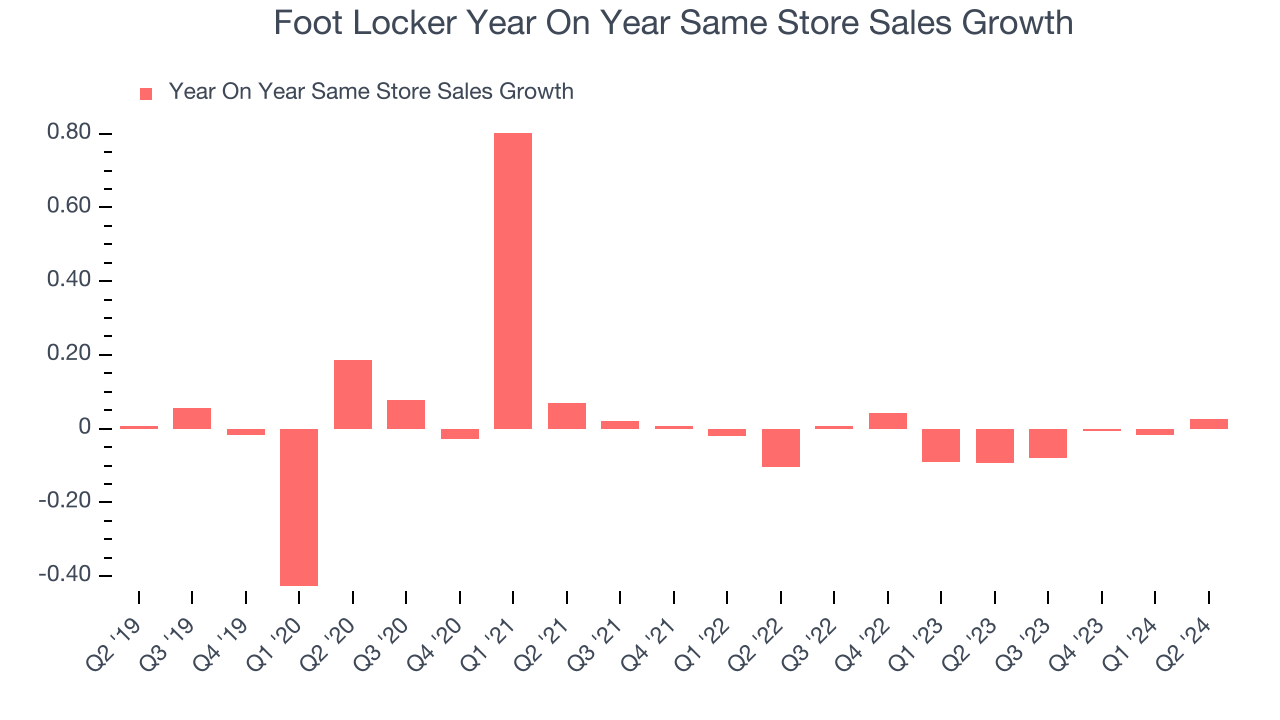Footwear and apparel retailer Foot Locker (NYSE:FL) reported results in line with analysts’ expectations in Q2 CY2024, with revenue up 1.9% year on year to $1.9 billion. It made a non-GAAP loss of $0.05 per share, down from its profit of $0.04 per share in the same quarter last year.
Is now the time to buy Foot Locker? Find out by accessing our full research report, it’s free.
Foot Locker (FL) Q2 CY2024 Highlights:
- Revenue: $1.9 billion vs analyst estimates of $1.89 billion (small beat)
- EPS (non-GAAP): -$0.05 vs analyst estimates of -$0.07 (32.1% beat)
- EPS (non-GAAP) guidance for the full year is $1.60 at the midpoint, beating analyst estimates by 3.9%
- Gross Margin (GAAP): 27.7%, in line with the same quarter last year
- EBITDA Margin: 2.2%, down from 3.5% in the same quarter last year
- Free Cash Flow was $12 million, up from -$112 million in the same quarter last year
- Locations: 2,464 at quarter end, down from 2,599 in the same quarter last year
- Same-Store Sales rose 2.6% year on year (-9.4% in the same quarter last year)
- Market Capitalization: $3.11 billion
Mary Dillon, President and Chief Executive Officer, said, "The Lace Up Plan is working, as evidenced by our return to positive total and comparable sales growth as well as gross margin expansion in the second quarter. Our top line trends strengthened as we moved through the quarter, including a solid start to Back-to-School. We were also particularly pleased to deliver stabilization in our Champs Sports banner. As planned, we relaunched our enhanced FLX Rewards Program in the United States during the quarter and have been encouraged by initial results. Our strategies are building momentum as we look to the remainder of the year, and we are reaffirming our full-year Non-GAAP EPS outlook."
Known for store associates whose uniforms resemble those of referees, Foot Locker (NYSE:FL) is a specialty retailer that sells athletic footwear, clothing, and accessories.
Footwear Retailer
Footwear sales–like their apparel counterparts–are driven by seasons, trends, and innovation more so than absolute need and similarly face the bigger-picture secular trend of e-commerce penetration. Footwear plays a part in societal belonging, personal expression, and occasion, and retailers selling shoes recognize this. Therefore, they aim to balance selection, competitive prices, and the latest trends to attract consumers. Unlike their apparel counterparts, footwear retailers most sell popular third-party brands (as opposed to their own exclusive brands), which could mean less exclusivity of product but more nimbleness to pivot to what’s hot.
Sales Growth
Foot Locker is larger than most consumer retail companies and benefits from economies of scale, giving it an edge over its competitors.
As you can see below, the company’s revenue was flat over the last five years as its store count dropped.

This quarter, Foot Locker grew its revenue by 1.9% year on year, and its $1.9 billion in revenue was in line with Wall Street’s estimates. Looking ahead, Wall Street expects revenue to remain flat over the next 12 months, a deceleration from this quarter.
Today’s young investors won’t have read the timeless lessons in Gorilla Game: Picking Winners In High Technology because it was written more than 20 years ago when Microsoft and Apple were first establishing their supremacy. But if we apply the same principles, then enterprise software stocks leveraging their own generative AI capabilities may well be the Gorillas of the future. So, in that spirit, we are excited to present our Special Free Report on a profitable, fast-growing enterprise software stock that is already riding the automation wave and looking to catch the generative AI next.
Same-Store Sales
A company’s same-store sales growth shows the year-on-year change in sales for its brick-and-mortar stores that have been open for at least a year, give or take, and e-commerce platform. This is a key performance indicator for retailers because it measures organic growth and demand.
Foot Locker’s demand has been shrinking over the last eight quarters, and on average, its same-store sales have declined by 2.7% year on year. The company has been reducing its store count as fewer locations sometimes lead to higher same-store sales, but that hasn’t been the case here.

In the latest quarter, Foot Locker’s same-store sales rose 2.6% year on year. This growth was a well-appreciated turnaround from the 9.4% year-on-year decline it posted 12 months ago, showing the business is regaining momentum.
Key Takeaways from Foot Locker’s Q2 Results
We were impressed by how significantly Foot Locker blew past analysts’ EPS expectations this quarter. We were also glad its full-year earnings guidance exceeded Wall Street’s estimates. Zooming out, we think this quarter featured some important positives, but the market was likely expecting more, as indicated by the +17% move in its share price over the last 30 days. The stock traded down 5.8% to $30.90 immediately following the results.
So should you invest in Foot Locker right now? When making that decision, it’s important to consider its valuation, business qualities, as well as what has happened in the latest quarter. We cover that in our actionable full research report which you can read here, it’s free.
